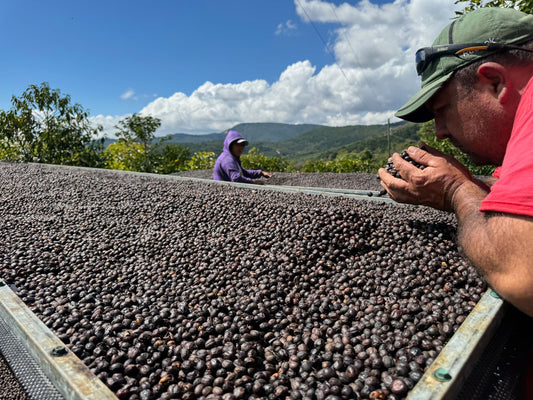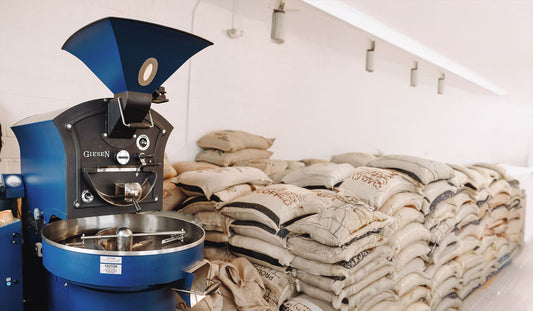Very specific climate conditions are required for coffee growing. These plants rely on mild-to-moderate temperatures, rich soil, ample rainfall, and shaded sun to not only grow but thrive. This is why coffee is primarily cultivated in Coffee Belt – a region around the equator that includes countries like Brazil, Ethiopia, and Vietnam.
But climate change is taking its toll. Rising temperatures and unpredictable weather patterns are altering growing conditions, leading to decreased yields and viable land for coffee growing. From producers to consumers, this volatility threatens the sustainability of the entire industry and the livelihoods of those who depend on it.
The Rising Temperatures of Climate Change On Coffee
Higher temperatures can have a devastating impact on coffee crops. Arabica coffee, which accounts for 70% of the world’s coffee, grows best at temperatures between 64° and 70°F (18° to 21°C). If temperatures rise much higher than this, the plants develop and ripen too quickly. While this may sound beneficial, rapid ripening often results in reduced bean quality. Continuous exposure to temperatures above 80°F (26.7°C) can cause severe stress to the plants, leading to stunted growth, yellowing leaves, and a decline in overall crop quality.
Dealing With Unpredictable Climate for Coffee Growing

A stable, moderate climate is essential for coffee cultivation, but climate change has disrupted this balance. Heavy rainfall leads to oversaturation of the soil, making cultivation difficult and reducing harvest yields. Furthermore, excessive rainfall disrupts the drying process, which is a critical step for maintaining the quality of coffee beans. On the other hand, droughts can slow down plant growth, delay harvests, and, in extreme cases, lead to crop failure.
Frost is also a concern for coffee farmers, particularly in Brazil. Severe frosts, which are more unpredictable due to climate volatility, can damage or kill coffee plants. In São Paulo and Minas Gerais, Brazil’s largest coffee-producing regions, black frost can destroy not just the season’s crop but also future harvests by killing the plants entirely.
These conditions make agroforestry systems, where trees are planted among coffee crops to create a more stable microclimate, an increasingly necessary strategy for farms in vulnerable regions. Trees help regulate temperature, reduce the risk of soil erosion from heavy rains, and provide a buffer against wind and frost.
Climate Change and Coffee Pests
Coffee pests and fungal infections love two things: warmer temperatures and wetter weather, both of which are delivered by climate change. Unfortunately, they can be extremely devastating to coffee cultivation. Coffee berry borers, the most harmful pests to coffee worldwide, can cut yields by up to 80%!
Volatile conditions have also boosted coffee’s worst natural enemy – coffee leaf rust. This disease causes coffee plants’ leaves to form yellow-orange spots. Infected coffee plants prematurely drop leaves and prevent the plant from turning sunlight into energy, or photosynthesizing. This leads to decreased yields, or even worse – the death of the plant.
Researchers are working on hybrid coffee varieties like Arabusta, which is more resistant to both pests and diseases. These hybrids are important for the future of coffee farming, but they may lack the nuanced flavors of pure Arabica, which remains the preferred variety for specialty coffee.
Addressing Climate Change for Coffee Cultivation

Unpredictable climate conditions are impacting coffee growing and the industry as a whole. Decreased yields can severely impact the farmers and communities in which coffee is an important part of the ecosystem. Less coffee produced means less coffee available, leading to increased demand and prices – which are the last things consumers want.
So, what can coffee producers do to mitigate the effects of climate change on coffee?
Sustainable Farming Practices
Supporting sustainable farming practices is crucial to preserving quality of land in coffee-growing regions and reducing producers’ environmental footprint. Sustainability is a core value at Ebru Coffee. We promote sustainable practices within the industry, supporting our producing and consuming communities by providing sustainable, single-origin coffee.
For example, on our farm in Angelândia in Minas Gerais, Brazil, we formulated a water management system. This sustainable system includes rainwater catchment areas and storage ponds to ensure steady water supply year-round.
We’ve also dedicated 20% of this same farm to planting indigenous trees in an effort to not only control coffee pests but maintain ecological balance in our coffee community.
Coffee Producer Impact Reports
As producers, we must ask ourselves how much of an impact we’re making on these regions and how we can do better for our coffee communities. Providing coffee and climate change impact reports is our way to ensure the future of coffee cultivation in harmony with the environment and support of the communities and cultures associated with production. In our impact reports, you’ll learn how Ebru Coffee:
- Environmental Stewardship: We actively engage in reforestation projects and water conservation initiatives. We also track metrics like water saved and waste reduced to quantify our positive environmental impact.
- Farm-to-Cup Approach: Direct collaboration with farmers improves the consistency of coffee beans. By working closely with producers, we ensure that only ripe cherries are picked, enhancing flavor quality. This approach also helps to streamline processing and maintain high coffee standards.
- Economic Impact: We assess the number of jobs created, including pickers, transporters, and processors, as well as the estimated income generated for local communities. This allows us to demonstrate how our operations contribute to the economic growth of coffee-producing regions.
- Educational Initiatives: Ebru Coffee supports educational programs aimed at empowering coffee farmers and pickers. These initiatives lead to improved agricultural practices, increasing yields and enhancing the overall quality of coffee produced in the region.
- Transparency: Our reports explain how we ensure fair compensation for farmers, including transparent pricing structures. We maintain open communication with coffee communities to ensure that all stakeholders benefit fairly from the production process.
- Impact Stories: Each report includes testimonials from farmers and community members, showcasing the real-life benefits of our initiatives. We share stories, photographs, and videos that bring these positive impacts to life.
Mitigating Climate Change for Future Coffee Production

Coffee growing is facing many challenges due to climate conditions. But with raised awareness and a shift towards sustainability, we can support coffee production for generations to come. Join us for an in-store educational class in Audubon, PA – and shop handpicked, specialty coffee beans at Ebru Coffee Co.





